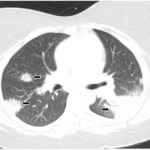I’m writing in regard to the article, “Fever of Unknown Origin” (TR, March 2016), by Charles Radis, DO. In regard to the non-caseating granulomas, there was no mention of epithelioid or giant cells. In addition, it was mainly [complement] C4 in the center of the granulomas, which is often found in sarcoidosis. Moreover, whether these were B cell positive, as in the granulomatous lesions of unknown significance syndrome, or B cell negative, as in sarcoidosis, is not reported.
From a diagnostic point of view, doing a Kveim-Siltzbach [test], which is positive in 80–90% of cases, would have been helpful. Over 40 years ago, when I started the rheumatology fellowship program at Mount Sinai in New York City, I heard Dr. Siltzbach—who with Alvin Tierstein ran the large sarcoidosis clinic—suggest that if you have muscle disease due to sarcoid, one always finds granulomas on biopsy. Perhaps, MRI of the muscle areas of the thighs with STIR [Short-TI Inversion Recovery] views might have shown the way for a muscle biopsy. As well, with synovial hypertrophy and active arthritis for many months, an MRI might have shown lesions of sarcoid or, at least, synovial inflammation, which on occasion—with a biopsy—would give the answer.
Alan Zalkowitz, MD
Fair Lawn, New Jersey


